Archive for the ‘Records Management’ Category
Written on: October 31, 2012 | 3 Comments
I hope that you and your families are well and safe after Sandy’s visit to the Northeast.
The National Archives buildings were largely spared, thanks to extensive preparation based on “lessons learned” from similar weather events. I am grateful to all of our staff and especially to our facilities and emergency staff for their ongoing work in keeping personnel and records safe. None of our records were damaged as a result of Hurricane Sandy, thanks to our staffs’ careful preparation.
At Archives I, in Washington D.C., our facilities staff took several precautionary steps prior to Hurricane Sandy’s arrival, including pumping down sump pits and pre-deploying the flood gates at the A1 moat openings. Additional measures implemented after the 2006 flooding including the installation of coffer dams and watertight doors, successfully limited water leakage to a minimal amount. The generator fuel tanks were filled and ready in case power was lost.
East Flood Wall (7th Street), Archives I Building, Washington DC:
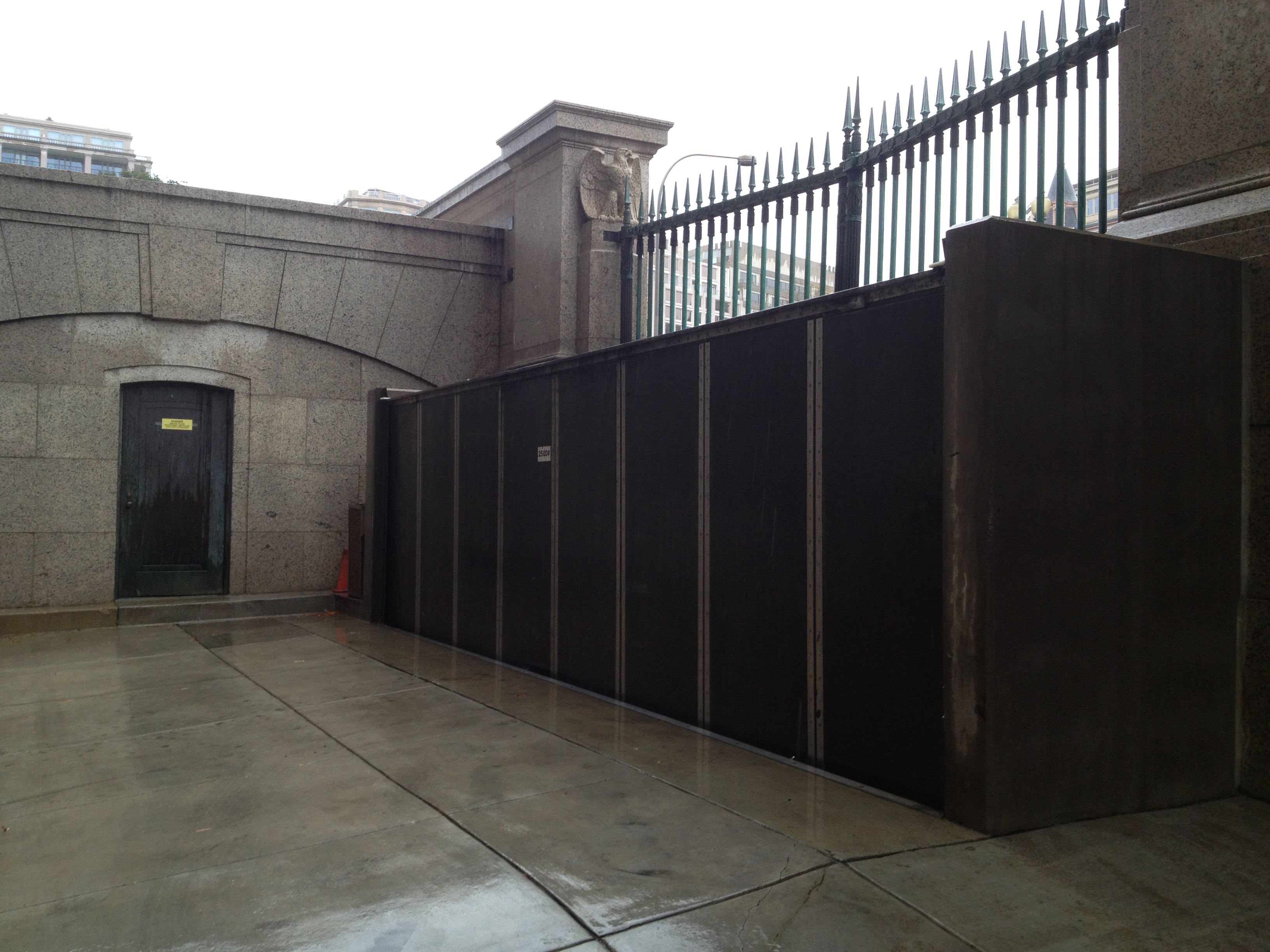
West Flood Wall (9th Street) Exterior, Archives I Building, Washington DC:
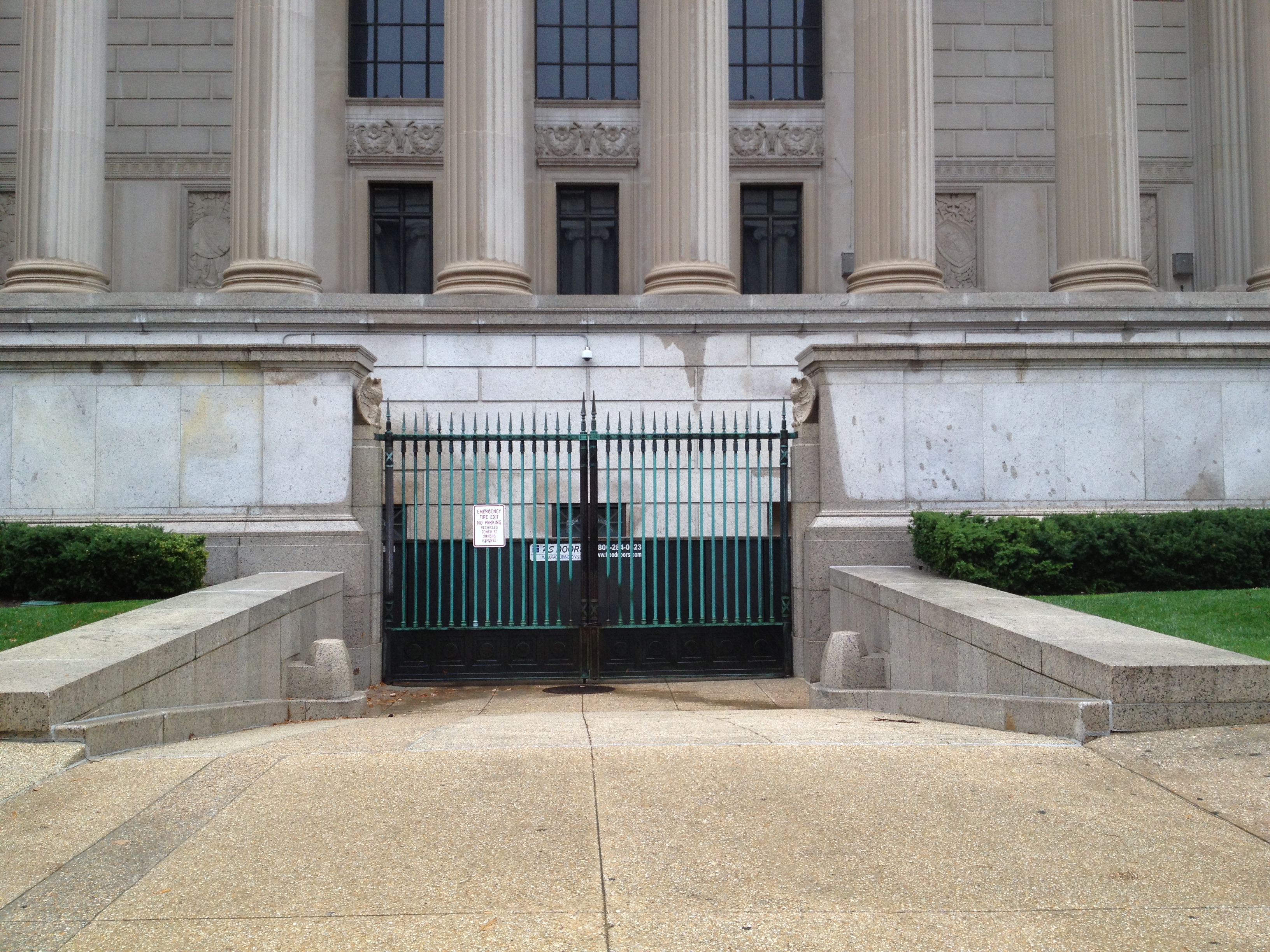
(Photo credit: Timothy Edwards, National Archives Facility Manager)
At Archives II, our facility at College Park, MD, advance preparations included pumping down the rain water storage tank and securing the exterior of the building, as well as filling the generator fuel tanks in case power was lost. Power service remained… [ Read all ]
Written on: August 24, 2012 | 3 Comments
In his Memorandum on Managing Government Records, President Obama stated “…proper records management is the backbone of open Government.” The Memorandum began an executive branch wide effort to reform records management policies and practices and required each agency to:
- identify a senior official responsible for records
- provide plans for improving or maintaining its records management program, especially electronic records; and
- suggest obstacles to sound, cost effective management policies and practices
Finally, the Memorandum mandates that the Director of the Office of Management and Budget (OMB) and I issue a Records Management Directive which focuses on:
- creating a Government wide records management framework that is more efficient and cost effective
- promoting records management policies and practices that enhance the capability of agencies to fulfill their statutory missions
- maintaining accountability through documentation of agency actions
- increasing open Government and appropriate access to Government records
- supporting agency compliance with applicable legal requirements related to the preservation of information relevant to litigation; and
- transitioning from paper-based records management to electronic records management where feasible.
I am pleased to report that this morning Jeffrey Zients, Acting Director of OMB and I issued the Managing Government Records Directive. With lots of hard work on the part of National Archives and Records Administration, White House, Federal agency staffs and stakeholder groups, the directive charts new directions… [ Read all ]
Written on: August 24, 2012 | 0 Comments
Colleen Wallace Nungari’s painting, Dreamtime Sisters, was selected as the “brand” for the International Council on Archives Congress which closes today in Brisbane, Australia. More than 1,000 archivists from 95 countries gathered to dream about the future around the theme, “A Climate of Change.”

Dreamtime Sisters, by Colleen Wallace Nungari
I was particularly struck by the theme of Nungari’s artwork and the relationship to the week’s deliberations. Dreamtime, in Aboriginal culture, described the period before living memory when the earth and all living things were created by Spirits from above and below. Dreamtime stories embody the culture and customs passed down and celebrated to this day.
Against that backdrop, as the group gathered for the opening session where I was invited to speak about social media, I encouraged them keep that image in mind as we deliberated on the state of the art of preserving today’s and tomorrow’s “living memory.” Honor the past as we create the future.
Read the full text of my address at the International Council on Archives Congress in Brisbane, Australia.
Written on: March 29, 2012 | 2 Comments
Writing in Tuesday’s Wall Street Journal, Melinda Beck quotes Kit Anderson, past president of the Institute for Challenging Disorganization (check out their website! www.nsgcd.org): “Digital clutter doesn’t beget mice or interfere with walking around the house. But it’s more insidious because no one else is going to insist that you get help.”
It is an article which struck a chord with me as we encourage staff here at the National Archives to take a look at the digital files they are maintaining. But it is a message for non-work digital clutter also.
“Hoarding is officially considered a form of obsessive-compulsive disorder, but some hoarders also suffer from attention-deficit-hyperactive disorder. Some digital hoarders are driven perfectionists who don’t know when to stop researching or collecting.” Ouch!
Some tips offered in the article:
- Practice ‘zero email.’ Clear your inbox every day.
- Declare ‘email bankruptcy.’ Delete every unread message and alert your 10 best friends and colleagues to resend crucial messages. NARA staff—not advised!
- Unsubscribe to every newsletter and mailing list not needed.
- Make use of your spam filter
Beck also reports that people typically use only about 20% of what they save. So…how are you doing? Where on the digital hoarding scale do you fall?
Written on: January 10, 2012 | 34 Comments
In September 2011, the White House launched an online petition web site, We the People, where anyone can post an idea asking the Obama administration to take action on a range of issues, get signatures, and get a response from their government.
It’s an experiment in democracy, which is generating new ideas and improving on old ideas every day. One of those rising ideas is “Yes We Scan.”
Yes We Scan is an effort by the Center for American Progress and Public.Resource.org to promote digitization of all government information in an effort to make it more accessible to the world.
Here at the National Archives, we house the nation’s permanent records, and we think increasing access to our collections in this way is a great idea. Our most recent efforts to do this ourselves as part of our OpenGov initiative, include the Citizen Archivist project, a Wikipedian in Residence, Tag it Tuesdays, and Scanathons. We are also moving forward on implementing the President’s recent Memorandum on Managing Government Records, which focuses on the need to update policies and practices for the digital age.
Wikipedia “ExtravaSCANza” at the National Archives in College Park, MD. January… [ Read all ]
Written on: November 28, 2011 | 6 Comments
Today, the President issued a memorandum to heads of Executive Departments and Agencies on Managing Government Records. This marks the start of an executive branch-wide effort to reform records management policies and practices.
I strongly support this Presidential initiative, which sends a very clear message to Federal agencies about the importance of managing electronic records. Records management must keep up with the technologies used to create records in the Federal government, and the President’s Memorandum underlines the critical nature of this responsibility.
Each agency will be required to report to the Archivist the name of a senior agency official who will supervise an agency-wide evaluation of its records management programs. These evaluations, which are to be completed in 120 days, are to focus on electronic records, including email and social media, as well as those programs that may be deploying or developing cloud-based services.
The President’s memorandum also asks that the National Archives identify opportunities for reforms that would facilitate improved government-wide records management practices. We will begin immediately to coordinate discussions with Federal agencies, interagency groups, and external stakeholders.
My staff and I look forward to working with OMB, the Associate Attorney General, and all agencies to ensure that they comply with the new Memorandum and that we continue a government-wide effort to preserve permanent electronic records that eventually become part of… [ Read all ]
Written on: September 21, 2011 | 2 Comments
Yesterday, President Barack Obama unveiled the U.S. National Action Plan during a meeting in New York of the member nations of the Open Government Partnership. Last Week, the White House also issued a Status Report on the Administration’s Commitment to Open Government.
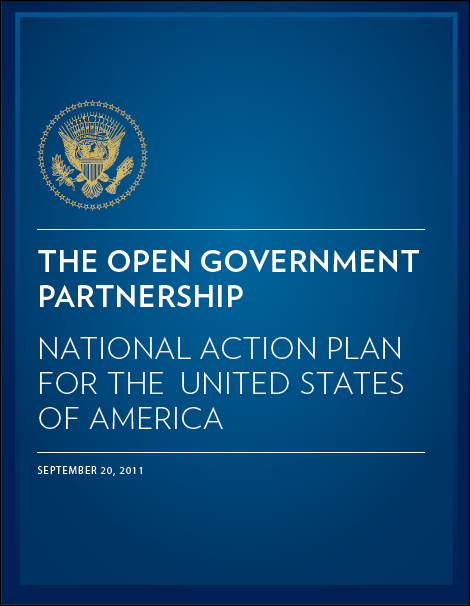
Over the past year and a half, I’ve written a lot about how the work of the National Archives is based on the belief that citizens have the right to see, examine, and learn from the records that document the actions of their government. The following are only a few of the areas where the National Archives is making significant contributions to strengthen open government and our democracy.
Records Management
The backbone of a transparent and accountable government is good records management. Good government cannot be held accountable if it does not preserve – and cannot find – its records. The exponential growth of electronic records poses multiple challenges. The National Archives will continue to play a leadership role in finding and developing cost-effective IT solutions needed to meet the electronic records management challenges found in Federal agencies today.
National Declassification Center
The National Declassification Center (NDC) is strengthening open government by improving coordination among agencies and streamlining the declassification process throughout the Federal Government. The NDC is leading a multi-agency effort to address the backlog… [ Read all ]
Written on: May 27, 2011 | 0 Comments
I enjoyed speaking with federal records managers on Wednesday at the National Archives’ Records Administration Conference (RACO). The records managers’ role in government is an essential part of our mission of preserving the records of the past and the present for study and use in the future.
When I spoke to this same group last year, I talked about the challenges that we face in records management. Thanks to their hard work, we have started to respond to those challenges. And we have made progress in improving the ability of the Federal government to manage its information.
Our progress includes:
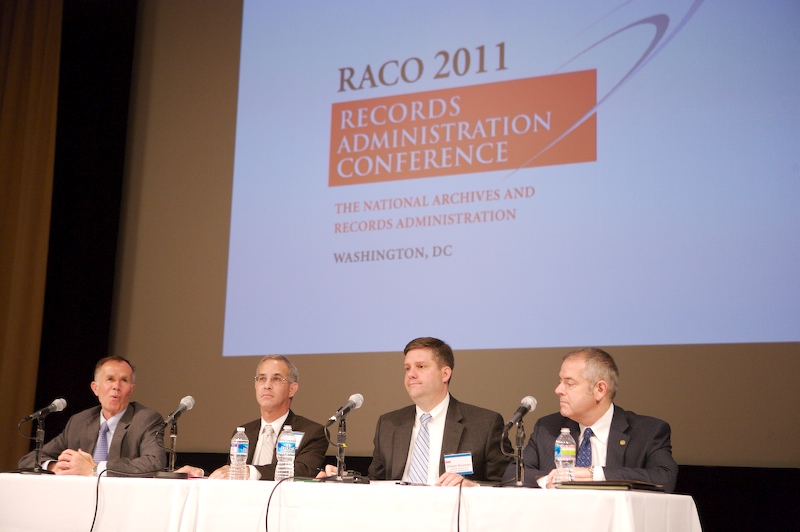
Panel Discussion with (Left to Right) Tom Mills, David Weinberg, William Bosanko, and Paul Wester of the National Archives.
The Archivist Achievement Award:
At last year’s conference, I challenged agencies to be more collaborative and to use technology in innovative ways to solve the records management challenges. A number of the nominees responded to that call, and I was pleased to provide The Archivist Achievement Award to two agencies this year:… [ Read all ]
Written on: February 3, 2011 | 6 Comments
In his State of the Union address last week, President Barack Obama said, “We can’t win the future with a government of the past.” He called for a reorganization of government to give the people “a government that’s more competent and more efficient.”
At the National Archives, we are meeting the President’s call to action. Charting the Course is our plan for reinventing the National Archives to meet the demands we face in the digital age.
Our plan was developed with the help of over 40 staff members working on the Transformation Launch Team and in consultation with hundreds of National Archives’ staff. It represents the changes we must make to better serve the American people.
How are we going to become more competent and more efficient?
We’re creating a new culture based on common values at the National Archives. We’re restructuring the agency to better serve the American people and the government. And we are living the principles of Open Government — transparency, participation, and collaboration.
The chart below represents the future structure of the National Archives. This is not a “rearrangement of the deck chairs,” but a bold new way of positioning ourselves to face the future.
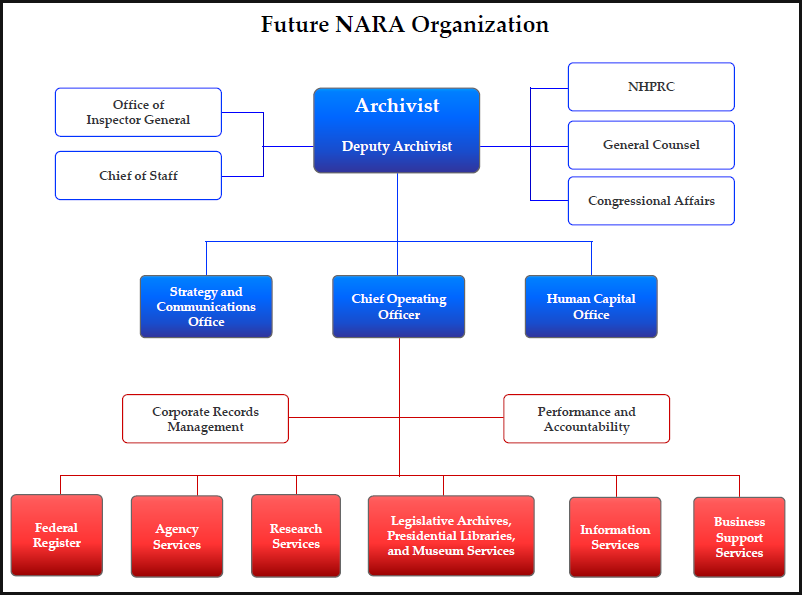
While the full story is told in… [ Read all ]
Written on: December 20, 2010 | 9 Comments
Change is not easy, but NARA staff members are doing it with enthusiam and we are seeing the results.
Wireless internet is now available for researchers who use our Washington, DC and College Park, MD facilities. This service is free and available to registered researchers.
On Monday, we launched the redesigned Archives.gov. With your help, we have made it easier for researchers, veterans, teachers, and visitors to find the information they are looking for. This summer, you voted and we listened.
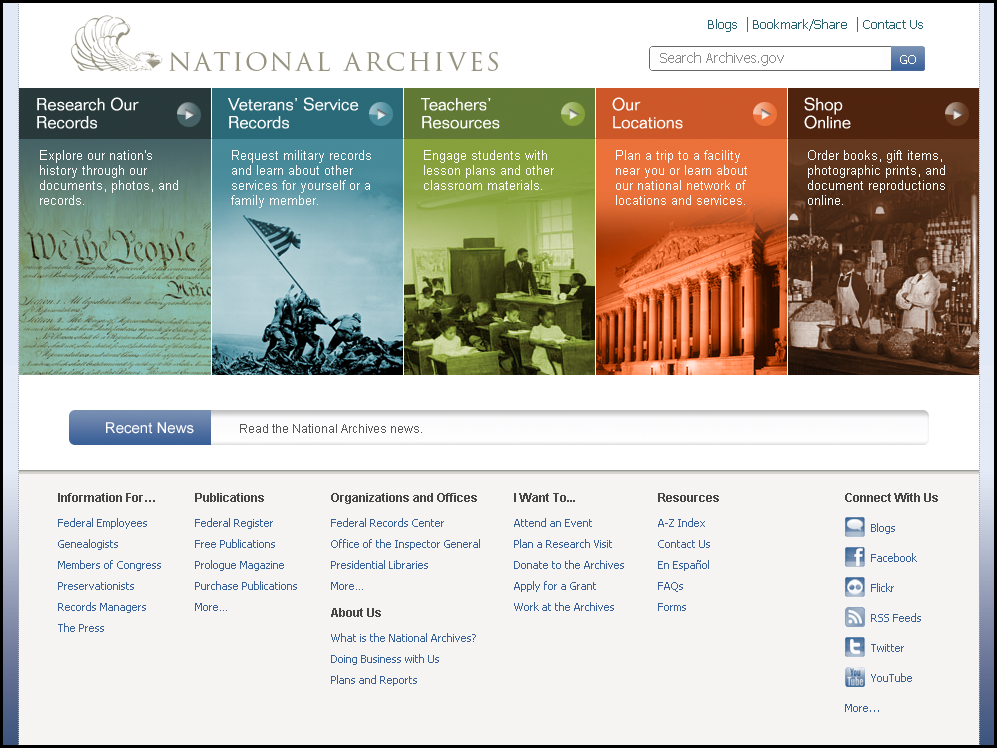
The Redesigned Archives.gov
Later this month, we will launch Online Public Access, a prototype for a new search and display in the research section of Archives.gov. We want to encourage you to experience the new search interface and send your feedback to search@nara.gov.
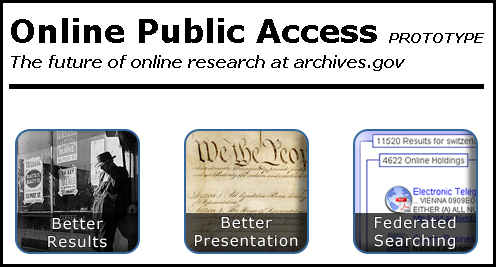
Coming Soon: Online Public Access
This month, we will also release the first National Archives’ mobile application called “Today’s Document,” based on the popular feature on Archives.gov.
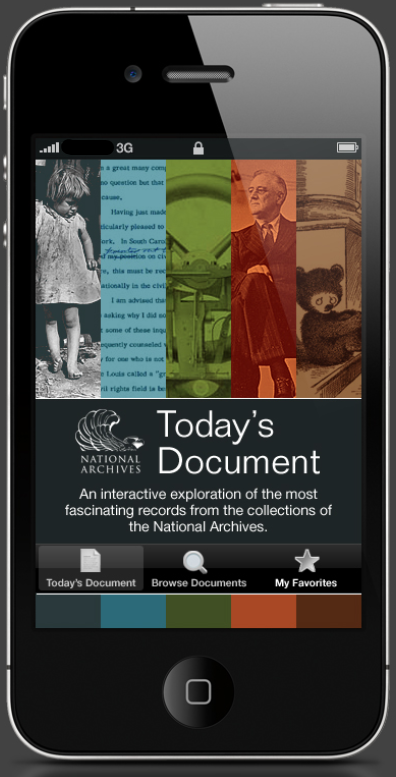
Also Coming Soon: Today’s Document Mobile App
And in January, NARA staff will begin to use an internal collaboration platform. This platform will use social-media based software to enable staff to better communicate, collaborate, and build communities.
We will see even more changes in this… [ Read all ]










